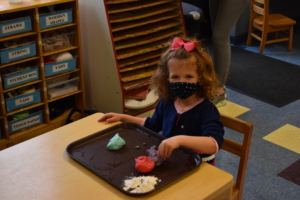“It is essential that high school career and technical education (CTE) programs align and develop partnerships with stakeholders in postsecondary CTE” (Source)
This article seeks to inform the reader about the relationship between a Careers in Education program and the Educator Preparation programs at a nearby liberal arts college. Central to the partnership’s success, stakeholders collaborate to:
- Develop and revise high-quality CTE curriculum
- Engage and support students in high school, and as they transition to higher education
Several of the programs’ graduates now teach in local schools. The impact of this partnership on education in the community is significant and can be heard through their voices.
Context
Keene High School (KHS) serves approximately 1,400 students from the city of Keene, New Hampshire, and several surrounding towns. The affiliated Cheshire Career Center serves three high schools throughout the region and comprises 19 programs. The Careers in Education course — originally called Child Care, then Early Childhood Education — is one of the original programs offered from when the center was built in the mid 1970s. In 2013, the state competencies shifted to a broader curriculum encompassing all aspects of education. Thus, the name changed to Careers in Education. This course provides students with the opportunity to explore education related careers while in high school.
Keene State College (KSC) offers educator preparation programs in Early Childhood, Elementary, Secondary, Music and Physical Education. The CTE and undergraduate programs, alike, demonstrate a strong commitment to providing clinical experiences in stimulating learning environments with highly skilled cooperating professionals. When engaged in both programs, students conduct observations, plan and implement lessons, and learn best practices for at least six years before beginning their careers.
“Programs and initiatives that blend CTE with rigorous academic coursework are providing students with increasingly advanced sets of precollege learning experiences.” (Source)
Collaboration for shared success
Faculty from the Early Childhood and Elementary Education programs serve on the program advisory board for the Careers in Education program. The board meets formally twice each academic year and communicates on a regular basis. Made up of educators with a variety of experiences and abilities, the board serves to advise, assist, support and advocate. Recently, they have supported the Careers in Education program in many ways.
- Suggesting new instructional equipment or material
- Assisting with safety protocols
- Helping to align curriculum with higher education and industry standards
- Promoting the program throughout the greater community
After examining the content in the first-year courses at Keene State — along with past practices in the secondary CTE program — instructors designed new experiences for student learners. One of these new experiences broadened students’ clinical time within the education field. The changes meant students would spend more time observing in local elementary and middle school classrooms. Careers in Education program faculty also scaffolded the content carefully to ensure the CTE students met competencies. Additionally, they designed their lessons in a similar format across programs, so the students would know what to expect when advancing to higher education.
Students visit KSC during their junior and senior years to explore the campus community and learn about education programs. A visit to the Child Development Center on campus allows students to experience an environment like their own preschool classrooms. Through this experience, students begin to see the opportunities available to them in their own community. And they gain a stronger understanding of higher education.
“Colleges and universities must learn to meet students’ needs and demands while they are still in high school and help them transition into college and the workforce” (Source)

Impact on the students and community
Graduates who choose to further their education at Keene State College arrive with a solid understanding of best practices. They often transition seamlessly into experiences in higher education. Confidence in writing and implementing lesson plans comes naturally since students had similar experiences in high school. This allows them to make rich connections during college classes.
One graduate remarked:
“The most valuable part of my time at KHS and KSC wasn’t the time I spent in a high school classroom or college lecture hall; it was the time I was in real classrooms with experienced educators — learning on my feet how to be a teacher. I saw the heart, soul and long hours these educators put into their jobs as teachers and how it made the learning come alive for their students. These are not skills that can be learned in a textbook or discussed anecdotally. Real-life, hands-on experience is the best way to learn how to teach.”
Benefits of collaboration beyond the walls of the classroom
Often, local administrators reach out to faculty in the programs seeking former students to fill vacancies in their schools. And many of the shared graduates decide to become educators in the community in which they were prepared. One former student said her decision to stay local was an easy one.
“I wanted to be able to help children appreciate where they’re from and celebrate what makes our local area special. I believe it is important for students to feel connected and grounded in order to feel safe and learn. One way this can be accomplished is to be proud of where they live and take part in their local communities.”
The programs, in partnership, align curriculum and learning opportunities to provide students with rich learning experiences. Seeing the graduates then carry their learning into classrooms throughout the community is rewarding. That makes our continued collaborative efforts worthwhile.
Kimberly J. Bohannon, Ed.D., is an associate professor at Keene State College. She is the coordinator of the Elementary Education program and teaches throughout the program with a passion for elementary methods courses and student teaching. Her research interests include P–12 partnerships and faculty-student relationships.
Jennifer C. Antosiewicz has served as the Careers in Education teacher at Keene High School, Cheshire Career Center for 21 years as well as maintaining a highly qualified lab school which follows the NAEYC program requirements.








